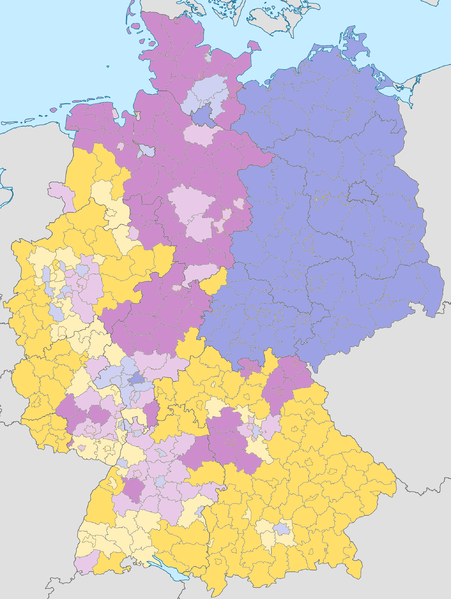An addendum to all the answers given so far:
None of the statistics given and discussed are a reliable indicator for what the question asked
An important reminder for all statistics from Germany on that topic:
Religious affiliation: The information does not refer to religious conviction, but to legal affiliation to a church, religious or philosophical community.
Source Statistisches Jahrbuch – Bevölkerung (Statistisches Bundesamt, Statistisches Jahrbuch 2017)
That means these census data are completely non-descriptive for the belief systems prevalent in any German city. It is only about declared, professed and legally processed membership. For the whole country this data compares as follows:
Around 49.4 million or 62.0% of all people in Germany are members of the two large public Christian religious societies. They belong to 50.3% (24.9 million) to the Roman Catholic Church and 49.7% (24.6 million) to the Evangelical Church. Orthodox churches (1.3%) rank third among the public religious societies by a clear margin, followed by the public Protestant free churches (0.9%). With a share of 0.1%, the Jewish communities represent only a small proportion of the public religious societies in Germany. Another 2.7% are committed to another public religious society. 33.0% of the respondents - including, for example, non-public Christian or Jewish communities - do not belong to a public religious society.
Source: Statistische Ämter des Bundes und der Länder, Zensus Kompakt, Ausgabe 2014, p 16.
That means you might be religious, believe in God but not be a member of of one the officially sanctioned communities. That means as well that you might be a member of a sanctioned church, pay the church tax to the state and be a complete atheist.
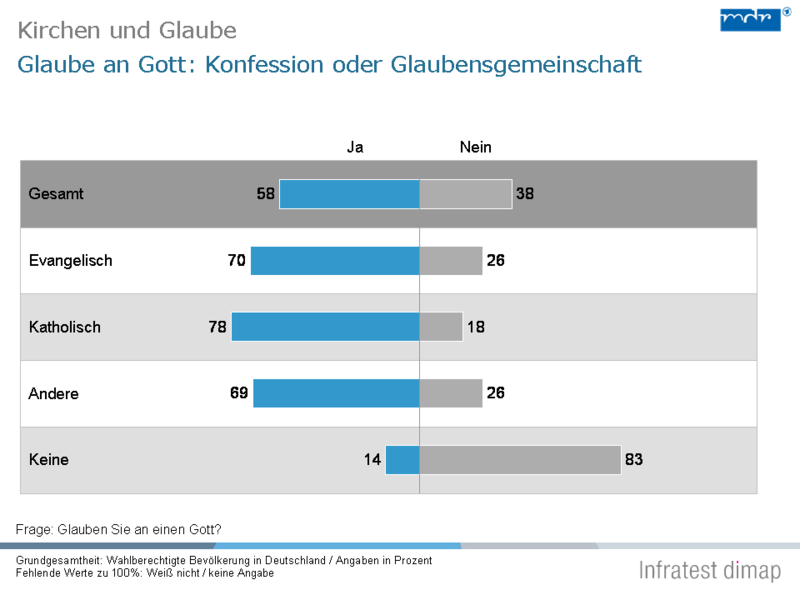
Question: "Do you believe in God?" results displayed according to church membership. Source: Infratest-Dimap – Kirche und Glaube
28% of members of the protestant church are self-declared atheists.
One valid and meaningful interpretation for the census checkbox "konfessionslos" would be "not paying church tax".
For a long time you had to leave the church officially to get ahead in the GDR (joining a political party instead), while you might had to stay in church to get ahead in the West. This was only deemed illegal discrimination based on religious grounds recently. If your employer insisted on getting to know your religion and ensure you had the right one. This was even the norm if the employer was a church, like for example in a kindergarten or hospital. That is one reason for the biggest differences between East and West. But it sounds much more fundamental, when in reality the decline was not sharply divided by political boundaries along the iron curtain and also not so much dependent on Catholicism vs Protestantism. This is much more gradual over space and time. Spain, Italy remaining much more religious than Scandinavia, Germany, and even Poland and Russia.
The personal attitude towards religion cannot be gathererd from official statistics like a census. For that topic you need a survey.
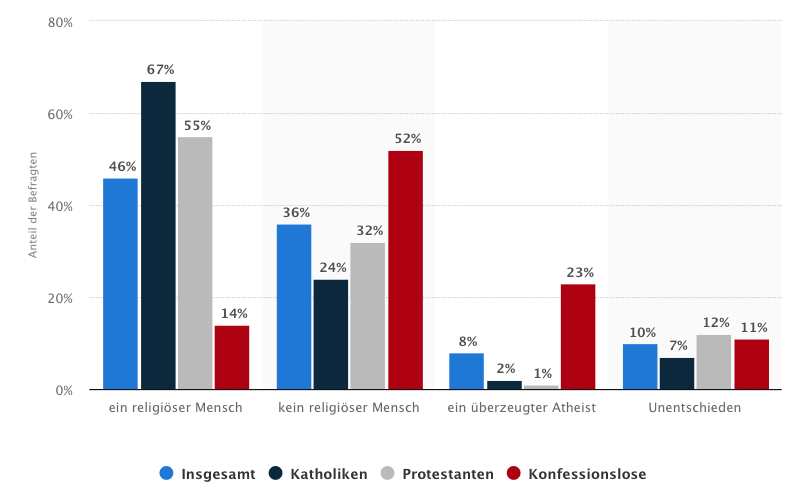 Question asked: "Whether you go to church or not - would you say you are…"
Question asked: "Whether you go to church or not - would you say you are…"
Source: Statista Einmal abgesehen davon, ob sie in die Kirche gehen oder nicht - würden Sie sagen, Sie sind…
This reveals atheists at a low 8% overall.
But surveys have also their inherent weaknesses. One multinational survey that indeed identified East-Germany as more or less the most atheist place on Earth (Tom W. Smith: "Beliefs about God across Time and Countries", 2012 [stating in 1991]) highlights this complication:
The one country that shows a low association between the level of atheism and strong belief is Japan. Japan ranked lowest on strong belief, but also in the lower half on atheism (a difference of 18 positions across the two rankings when the average difference in positions was only 2.7 places). Japan is distinctive among countries in having the largest number of people (32%) in the middle categories of believing sometimes and the agnostic, not knowing response. This pattern is consistent with a general Japanese response pattern of avoiding strong, extreme response options (Smith, 2004). [An easy to digest German article on that report Warum so wenige Ostdeutsche an einen Gott glauben visualising that data, but drawing quite questionable conclusions…]
Again, for the whole of Germany there were some reasons evaluated by respondents for why people left the biggest lutheran church:
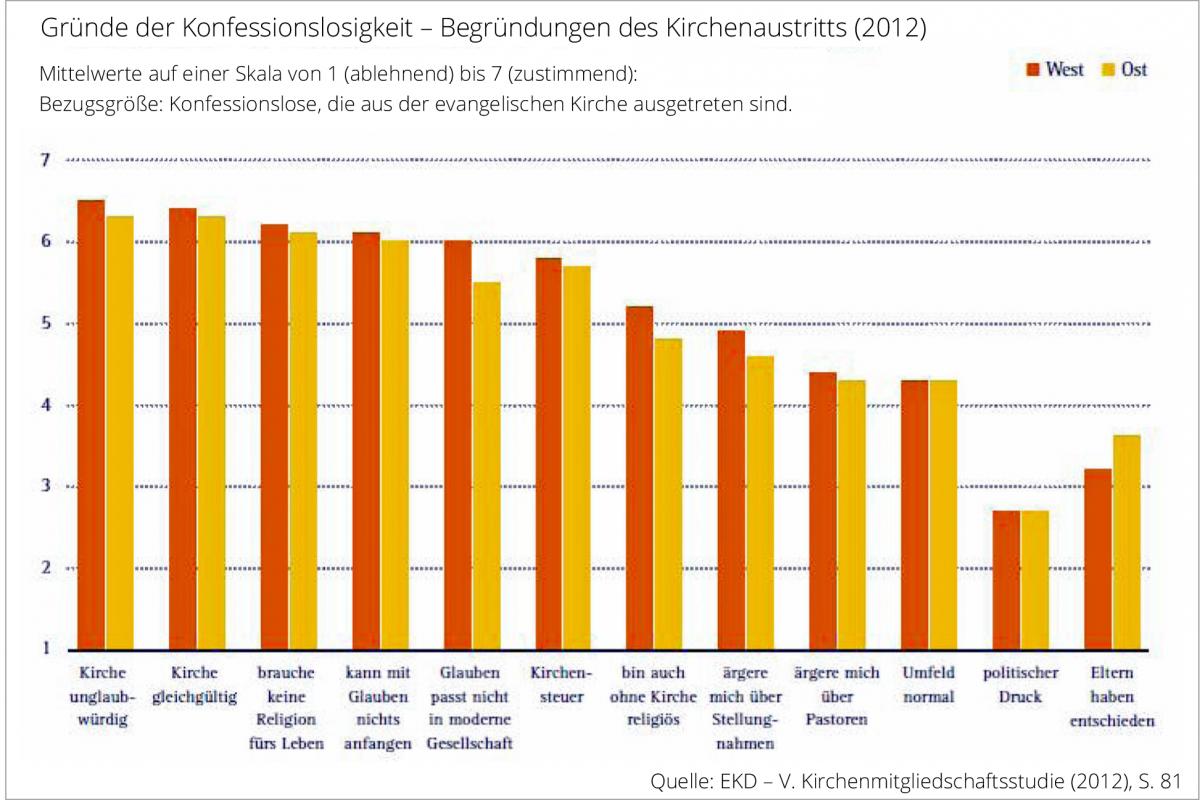
Source: Bedeutung von Religion in Deutschland 2017, 2015, 2012, 2011, 2008
Listing the reasons as the church itself being unbelievable, the church itself being indifferent as two factors bigger than being irreligious. And at the fifth position the ever so unpopular church tax that the state collects on behalf of the churches, if you are a registered memeber of the sanctioned churches.
Since the original question inquires about a specific city in the East and bases its reasoning on recent numbers:
The question was: "With the fall of the Berlin Wall in 1989, the lives of many Germans have changed. How is that for you personally, has religion become more or less important in your life since then?" 60 percent say that it has remained the same for you, religion has become more important for 13 percent and less important for 20 percent. It is remarkable that in the eastern federal states those who say religion has become less important to them personally are 30 percent compared to 18 percent in the western federal states. The decline in the importance of religion, however, is in both the West and the East.
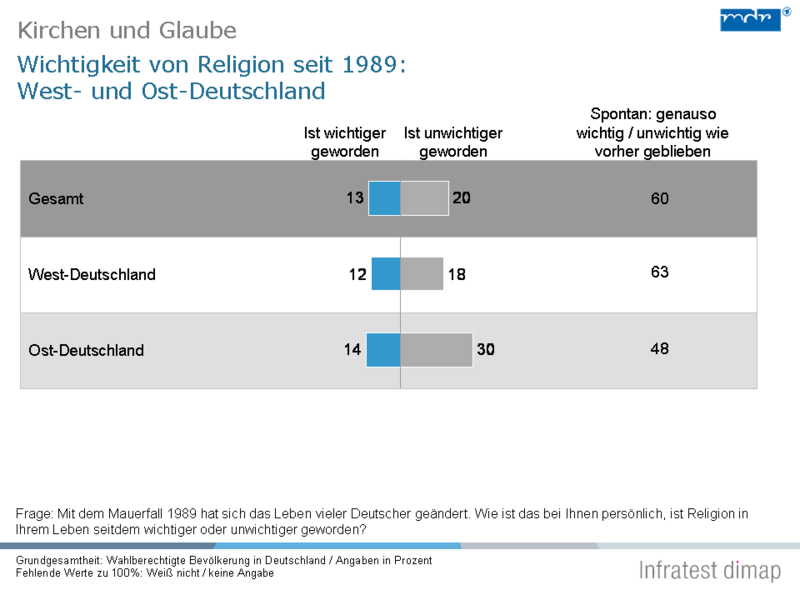
Source: Bedeutung von Religion in Deutschland 2017, 2015, 2012, 2011, 2008
That means while religion was relatively less important in the East when the wall came down, its decline in the East has even more accelerated compared to the West.
In the German Democratic Republic the Christian churches had to face fierce discrimination by the state until 1961. These obstructions were attenuated after the wall was built and one reason for church attendance as 'high' as it was can be found in the role the churches and church communities played in opposing the party and system of the state.
The number of Protestant Church members has decreased from
14,800,000 in 1950 to approximately 7,900,000 in 1977. The
number of members of the Catholic minority Church has
remained fairly constant, currently at 1,200,000 Church
members (estimate by DDR Handbuch 1979; no official statistics
are published).
Source: A Church Within Socialism: Religion in the GDR Today (1980)
Differences between East-Germany its Eastern neighbours seem perplexing:
Religiosity in the postwar period and de-Christianization afterwards reached especially great proportions in Central Europe, whereas the religious revival in Central Europe after 1978 is unparalleled. Another distinguishing feature is the adaptation of church structure to conditions of totalitarianism by the `underground church'. Different interpretations of these features are examined. Secularization theory does not offer sufficient explanation, partly because totalitarianism counteracted sociocultural differentiation. The rational choice approach does not fit either, because both premodern attributes and the social confrontation with totalitarianism and the resulting bipolar arrangement of the sociocultural system contradicted market conditions. The best explanatory concept is found in acculturation which produced distinct patterns of religiosity in different age cohorts.
Source: Miklós Tomka: "Coping with Persecution
Religious Change in Communism and in Post-Communist Reconstruction in Central Europe", International Sociology, Volume: 13 issue: 2, page(s): 229-248, 1998
While there are some peculiarities to observe in the East of Germany, and Dresden in particular, most of these numbers are statistical artifacts. Germany lies perfectly in line with the dechristianisation of Europe:
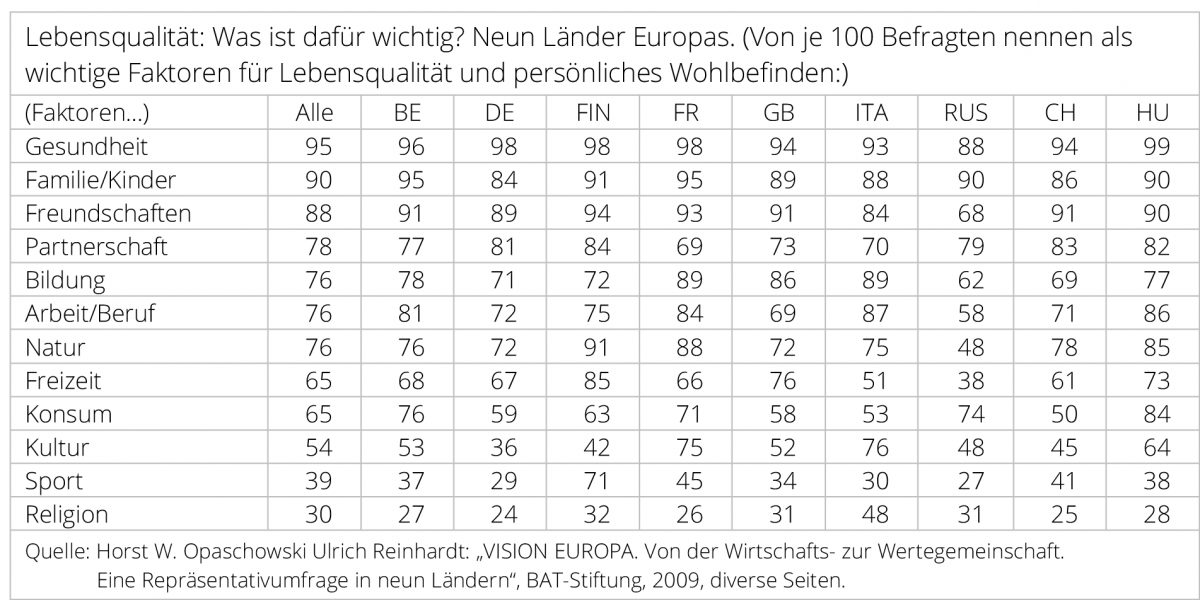 Survey abourt relative importance of factors regarding "quality of life". Mean is 30%, Italy the exception with 48%. Russia: 31%, Hungary: 28%, France: 26% and Germany 25%
Survey abourt relative importance of factors regarding "quality of life". Mean is 30%, Italy the exception with 48%. Russia: 31%, Hungary: 28%, France: 26% and Germany 25%
Source: Bedeutung von Religion in Deutschland 2017, 2015, 2012, 2011, 2008
Now compare the official statistics from Dresden in the East with those of Hamburg from the West (well, or North):
Von der Bevölkerung waren 1880:
- Evangelische 92,5 %,
- Katholische 2,7 %,
- Israeliten 3,5 %,
- 1,3 % Bekenner anderer Religionen oder ohne Religionsbekenntnis.
Nach der Statistik der EKD waren Ende 2015
- 27,0 % der Hamburger Bevölkerung evangelisch und
- 10,7 % katholisch.
- 62,3 % haben ein anderes oder kein religiöses Bekenntnis.
Source: Wikipedia – Religion und Weltanschauung in Hamburg
Going back to the "logic" from the original question:
there must be a lower percentage of Christians in Russia than in Dresden
Statistics are collected differently in Russia and the numbers vary greatly. Looking at the highest number from recenzt years it reaches up to 80% calling themselves as Russian-Orthodox.
But that is not an accurate picture.
Attempts to examine the worldview of those people who call themselves orthodox usually ended with the statement that religious consciousness is dominated by "religious syncretism" and "eclecticism. In 2005, for example, 22 percent of the Russian population believed in the migration of souls, 42 percent in astrology, 19 percent shared the idea of a God "with whom man can establish personal relationships". According to D. Furman, religion has not defeated atheism in Russia, but religion and atheism both face the growth of ideological ambiguities and an ideological eclecticism that includes the belief in a "survival of the soul", astrology, ufology, "energetic vampires", magicians, shamans, etc., forming an unstructured form of constantly changing elements that are not logically connected.
Source: Nadeschda Beljakowa: "Religiöses Leben im heutigen Russland – Ideal und Wirklichkeit" 2010
Going from often state sponsored statistics and surveys to scientific, sociological approaches reveals quite a different picture than what the numbers from Wikipedia suggest:
The more modernized countries of previously Communist Central Europe score, in belief and in religious practice significantly below non-Protestant Western countries. This non-belief contains no hostility against religion, but no special sympathy either. The young generation grew up simply without any convincing religious socialization and education. […] Social mechanisms for the transmission of faith are lost, too.
(Tomka, 1998)
In another answer there is a quite often reproduced visual concerning the offical statistics about the distribution of counted religiousness (or membeship in offical religious organisations) in Germany. Many will say that seems to be true, obviously. Yet, the Catholic church in Germany itself says just 28,2% of the inhabitants of the whole country are counted as Catholic overall in the first place and the church itself considers most of its own members as just pro forma members ("Taufscheinkatholiken"), citing a church service attendance of just 9,8%.
Conclusion
Dresden is not that much more atheist compared to either Poland or Russia or another place in Germany. Don't get this wrong: Believe in God is low. The numbers are difficult to compare but the further East you go the less religious and the less Christian the inhabitants get. The de-christianisation of Europe is not uniformly distributed but more pronounced in the North and East. This process was accelerated only relatively mildly in former Eastern bloc states compared to the Western parts of Europe.
